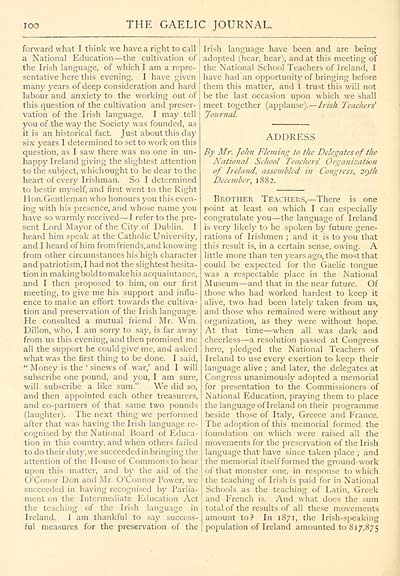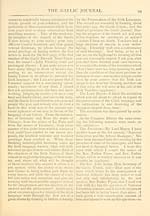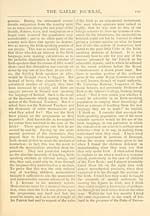Blair Collection > Gaelic journal > Volume 1, number 1
(112)
Download files
Complete book:
Individual page:
Thumbnail gallery: Grid view | List view

100
THE GAELIC JOURNAL.
forward what I think we have a right to call
a National Education — the cultivation of
the Irish language, of which I am a repre-
sentative here this evening. I have given
many years of deep consideration and hard
labour and anxiety to the working out of
this question of the cultivation and preser-
vation of the Irish language. I may tell
you of the way the Society was founded, as
it is an historical fact. Just about this day
six years I determined to set to work on this
question, as I saw there was no one in un-
happy Ireland giving the slightest attention
to the subject, whichought to be dear to the
heart of every Irishman. So I determined
to bestir myself, and first went to the Right
Hon. Gentleman who honours you this even-
ing with his presence, and whose name you
have so warmly received — I refer to the pre-
sent Lord Mayor of the City of Dublin. I
heard him speak at the Catholic University,
and I heard of him fromfriends.and knowing
from other circumstances his high character
and patriotism, I had not the slightest hesita-
tion in makingboldtomakehis acquaintance,
and I then proposed to him, on our first
meeting, to give me his support and influ-
ence to make an effort towards the cultiva-
tion and preservation of the Irish language.
He consulted a mutual friend Mr. Wm.
Dillon, who, I am sorry to say, is far away
from us this evening, and then promised me
all the support he could give' me, and asked
what was the first thing to be done. I said,
" Money is the ' sinews of war,' and I will
subscribe one pound, and you, I am sure,
will subscribe a like sum." We did so,
and then appointed each other treasurers,
and co-partners of that same two pounds
(laughter). The next thing we performed
after that was having the Irish language re-
cognised by the National Board of Educa-
tion in this country, and when others failed
to do their dut)', we succeeded in bringing the
attention of the House of Commons to bear
upon this matter, and by the aid of the
O'Conor Don and Mr. O'Connor Power, we
succeeded in having recognised by Parlia-
ment on the Intermediate Education Act
the teaching of the Irish language in
Ireland. I am thankful to say success-
ful measures for the preservation of the
Irish language have been and are being
adopted (hear, hear), and at this meeting of
the National School Teachers of Ireland, I
have had an opportunity of bringing before
them this matter, and I trust this will not
be the last occasion upon which we shall
meet together (applause). — Irish Teachers'
Journal.
ADDRESS
By 3ir. Joint FUuiing to the Delegates of ihe
National School Teachers Organization
of Ireland, assembled in Congress, igth
December, 1882.
Brother Teachers,— There is one
point at least on which I can especially
congratulate you — the language of Ireland
is very likely to be spoken by future gene-
rations of Irishmen ; and it is to you that
this result is, in a certain sense, owing. A
little more than ten }-ears ago, the most that
could be expected for the Gaelic tongue
was a respectable place in the National
Museum — and that in the near future. Of
those who had worked hardest to keep it
alive, two had been lately taken from us,
and those who remained were without any
organization, as they were without hope.
At that time — when all was dark and
cheerless — a resolution passed at Congress
here, pledged the National Teachers of
Ireland to use every exertion to keep their
language alive ; and later, the delegates at
Congress unanimously adopted a memorial
for presentation to the Commissioners of
National Education, praj-ing them to place
the language of Ireland on their programme
beside those of Italy, Greece and P"rance.
The adoption of this memorial formed the
foundation on which were raised all the
movements for the preservation of the Irish
language that' have since taken place ; and
the memorial itself formed the ground- work
of that monster one, in response to which
the teaching of Irish is paid for in National
Schools as the teaching of Latin, Greek
and French is. And what does the sum
total of the results of all these movements
amount to? In 1871, the Irish-speaking
population of Ireland amounted to 817,875
THE GAELIC JOURNAL.
forward what I think we have a right to call
a National Education — the cultivation of
the Irish language, of which I am a repre-
sentative here this evening. I have given
many years of deep consideration and hard
labour and anxiety to the working out of
this question of the cultivation and preser-
vation of the Irish language. I may tell
you of the way the Society was founded, as
it is an historical fact. Just about this day
six years I determined to set to work on this
question, as I saw there was no one in un-
happy Ireland giving the slightest attention
to the subject, whichought to be dear to the
heart of every Irishman. So I determined
to bestir myself, and first went to the Right
Hon. Gentleman who honours you this even-
ing with his presence, and whose name you
have so warmly received — I refer to the pre-
sent Lord Mayor of the City of Dublin. I
heard him speak at the Catholic University,
and I heard of him fromfriends.and knowing
from other circumstances his high character
and patriotism, I had not the slightest hesita-
tion in makingboldtomakehis acquaintance,
and I then proposed to him, on our first
meeting, to give me his support and influ-
ence to make an effort towards the cultiva-
tion and preservation of the Irish language.
He consulted a mutual friend Mr. Wm.
Dillon, who, I am sorry to say, is far away
from us this evening, and then promised me
all the support he could give' me, and asked
what was the first thing to be done. I said,
" Money is the ' sinews of war,' and I will
subscribe one pound, and you, I am sure,
will subscribe a like sum." We did so,
and then appointed each other treasurers,
and co-partners of that same two pounds
(laughter). The next thing we performed
after that was having the Irish language re-
cognised by the National Board of Educa-
tion in this country, and when others failed
to do their dut)', we succeeded in bringing the
attention of the House of Commons to bear
upon this matter, and by the aid of the
O'Conor Don and Mr. O'Connor Power, we
succeeded in having recognised by Parlia-
ment on the Intermediate Education Act
the teaching of the Irish language in
Ireland. I am thankful to say success-
ful measures for the preservation of the
Irish language have been and are being
adopted (hear, hear), and at this meeting of
the National School Teachers of Ireland, I
have had an opportunity of bringing before
them this matter, and I trust this will not
be the last occasion upon which we shall
meet together (applause). — Irish Teachers'
Journal.
ADDRESS
By 3ir. Joint FUuiing to the Delegates of ihe
National School Teachers Organization
of Ireland, assembled in Congress, igth
December, 1882.
Brother Teachers,— There is one
point at least on which I can especially
congratulate you — the language of Ireland
is very likely to be spoken by future gene-
rations of Irishmen ; and it is to you that
this result is, in a certain sense, owing. A
little more than ten }-ears ago, the most that
could be expected for the Gaelic tongue
was a respectable place in the National
Museum — and that in the near future. Of
those who had worked hardest to keep it
alive, two had been lately taken from us,
and those who remained were without any
organization, as they were without hope.
At that time — when all was dark and
cheerless — a resolution passed at Congress
here, pledged the National Teachers of
Ireland to use every exertion to keep their
language alive ; and later, the delegates at
Congress unanimously adopted a memorial
for presentation to the Commissioners of
National Education, praj-ing them to place
the language of Ireland on their programme
beside those of Italy, Greece and P"rance.
The adoption of this memorial formed the
foundation on which were raised all the
movements for the preservation of the Irish
language that' have since taken place ; and
the memorial itself formed the ground- work
of that monster one, in response to which
the teaching of Irish is paid for in National
Schools as the teaching of Latin, Greek
and French is. And what does the sum
total of the results of all these movements
amount to? In 1871, the Irish-speaking
population of Ireland amounted to 817,875
Set display mode to: Large image | Transcription
Images and transcriptions on this page, including medium image downloads, may be used under the Creative Commons Attribution 4.0 International Licence unless otherwise stated. ![]()
| Early Gaelic Book Collections > Blair Collection > Gaelic journal > Volume 1, number 1 > (112) |
|---|
| Permanent URL | https://digital.nls.uk/79314260 |
|---|
| Description | No. 1, Vol. I. November, 1882. |
|---|---|
| Shelfmark | Blair.214 |
| Additional NLS resources: | |
| Attribution and copyright: |
|
| Description | A selection of books from a collection of more than 500 titles, mostly on religious and literary topics. Also includes some material dealing with other Celtic languages and societies. Collection created towards the end of the 19th century by Lady Evelyn Stewart Murray. |
|---|
| Description | Selected items from five 'Special and Named Printed Collections'. Includes books in Gaelic and other Celtic languages, works about the Gaels, their languages, literature, culture and history. |
|---|

